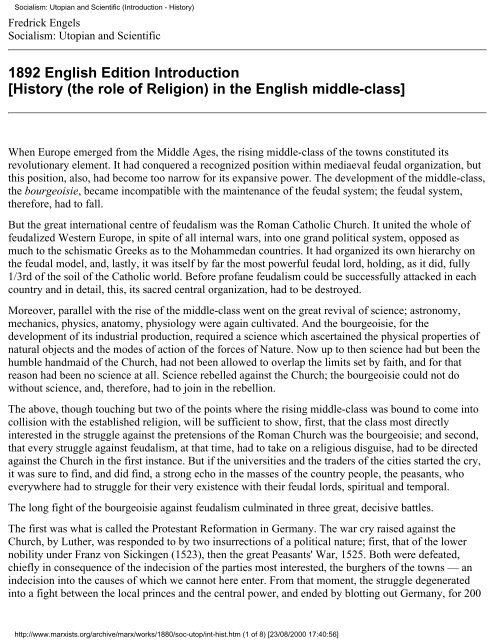Socialism: Utopian and Scientific - MIA
Socialism: Utopian and Scientific - MIA
Socialism: Utopian and Scientific - MIA
You also want an ePaper? Increase the reach of your titles
YUMPU automatically turns print PDFs into web optimized ePapers that Google loves.
<strong>Socialism</strong>: <strong>Utopian</strong> <strong>and</strong> <strong>Scientific</strong> (Introduction - History)Fredrick Engels<strong>Socialism</strong>: <strong>Utopian</strong> <strong>and</strong> <strong>Scientific</strong>1892 English Edition Introduction[History (the role of Religion) in the English middle-class]When Europe emerged from the Middle Ages, the rising middle-class of the towns constituted itsrevolutionary element. It had conquered a recognized position within mediaeval feudal organization, butthis position, also, had become too narrow for its expansive power. The development of the middle-class,the bourgeoisie, became incompatible with the maintenance of the feudal system; the feudal system,therefore, had to fall.But the great international centre of feudalism was the Roman Catholic Church. It united the whole offeudalized Western Europe, in spite of all internal wars, into one gr<strong>and</strong> political system, opposed asmuch to the schismatic Greeks as to the Mohammedan countries. It had organized its own hierarchy onthe feudal model, <strong>and</strong>, lastly, it was itself by far the most powerful feudal lord, holding, as it did, fully1/3rd of the soil of the Catholic world. Before profane feudalism could be successfully attacked in eachcountry <strong>and</strong> in detail, this, its sacred central organization, had to be destroyed.Moreover, parallel with the rise of the middle-class went on the great revival of science; astronomy,mechanics, physics, anatomy, physiology were again cultivated. And the bourgeoisie, for thedevelopment of its industrial production, required a science which ascertained the physical properties ofnatural objects <strong>and</strong> the modes of action of the forces of Nature. Now up to then science had but been thehumble h<strong>and</strong>maid of the Church, had not been allowed to overlap the limits set by faith, <strong>and</strong> for thatreason had been no science at all. Science rebelled against the Church; the bourgeoisie could not dowithout science, <strong>and</strong>, therefore, had to join in the rebellion.The above, though touching but two of the points where the rising middle-class was bound to come intocollision with the established religion, will be sufficient to show, first, that the class most directlyinterested in the struggle against the pretensions of the Roman Church was the bourgeoisie; <strong>and</strong> second,that every struggle against feudalism, at that time, had to take on a religious disguise, had to be directedagainst the Church in the first instance. But if the universities <strong>and</strong> the traders of the cities started the cry,it was sure to find, <strong>and</strong> did find, a strong echo in the masses of the country people, the peasants, whoeverywhere had to struggle for their very existence with their feudal lords, spiritual <strong>and</strong> temporal.The long fight of the bourgeoisie against feudalism culminated in three great, decisive battles.The first was what is called the Protestant Reformation in Germany. The war cry raised against theChurch, by Luther, was responded to by two insurrections of a political nature; first, that of the lowernobility under Franz von Sickingen (1523), then the great Peasants' War, 1525. Both were defeated,chiefly in consequence of the indecision of the parties most interested, the burghers of the towns — anindecision into the causes of which we cannot here enter. From that moment, the struggle degeneratedinto a fight between the local princes <strong>and</strong> the central power, <strong>and</strong> ended by blotting out Germany, for 200http://www.marxists.org/archive/marx/works/1880/soc-utop/int-hist.htm (1 of 8) [23/08/2000 17:40:56]














![tyf Enf=O=n]lgg](https://img.yumpu.com/47584932/1/190x245/tyf-enfonlgg.jpg?quality=85)

